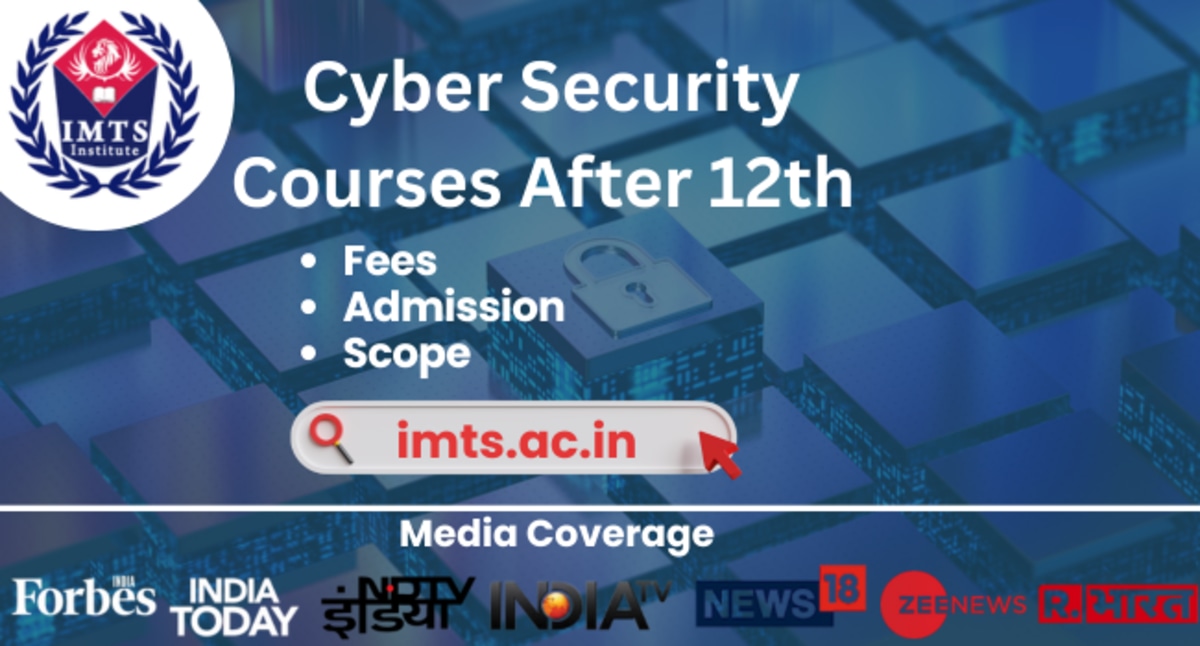There are several options to opt for a range of courses on cybersecurity after the 12th. Students can choose a certification, diploma, or bachelor’s program, such as BSc, BCA, or BTech, in the field of cybersecurity. To get admission in the course, students must have passed 10+2 from a recognized board with a minimum of 45%-50% marks. Further, you may need to pass an entrance test. Fees of the course can be between INR 5,000 to INR 8,00,000 depending on the course type, university, and duration of the course.
Cyber Security Courses After 12th Highlight Table:
Course name | Cyber Security Courses |
Duration | 3 months to 4 years |
Approved by | UGC, AICTE, and others |
Course mode | Regular, part-time, or Online |
Level | Certification, Diploma, and UG |
Eligibility | 10+2 from a recognized board |
Entrance exams | IIT JEE, CUET UG, and others |
Application fee | INR 500 to INR 3,000 |
Application mode | Online |
Documents Required | Aadhar Card, Photo, signature, Educational certificate and mark sheets, transfer certificates, character certificates, etc. |
Course fee | INR 5,000 to INR 8,00,000 |
Salary Package | INR 2 LPA to INR 6 LPA for freshers |
Cyber Security Courses After 12th Eligibility Criteria:
To get admission in the cybersecurity courses after the 12th, students should have passed 10+2 from a recognized board. In general, there is no requirement to have a specific subject in 10+2. To get admission in undergraduate level courses, you may need to have subjects Physics, Chemistry, and Mathematics. The minimum percentage of marks required is generally 45%- 50%. Some universities may require a greater percentage of marks. In addition, you may have to pass an entrance examination like IIT JEE, CUET UG, or others conducted by the university.
Cyber Security Courses After 12th Admission Process 2025:
To get admission in cybersecurity courses after the 12th, the Admission process can vary from university to university. Admissions to undergraduate courses may require passing an entrance exam. Certification and diploma-level courses generally do not require passing an entrance exam. Here are some common steps in the admission process :
Visit the university website and register.
Remember the ID and password used in the registration process.
Log in and fill up all the required information accurately.
Upload scanned documents like photographs, signatures, mark sheets, certificates, transfer certificates, character certificates, and others.
Apply and wait till the university announces the list of shortlisted candidates.
Being shortlisted, pay the fees.
Top Universities For Cyber Security Courses After 12th:
There are several universities offering certification, diploma, and undergraduate courses in cybersecurity. Below is a list of institutes offering a course in cybersecurity:
Certification Courses in Cyber Security :
IT Bangalore
IIT Kanpur
IIT Madras
Coursera
Chandigarh University
2. Diploma Courses in Cyber Security :
NIELIT (National Institute of Electronics and Information Technology).
GITAM University
IACSD (International Academy of Computer Science and Development)
MIT School of Technology Management
3. Bachelor’s degree in cybersecurity:
IIT Kanpur
IIT Madras
Amity University
Lovely Professional University
Chandigarh University
Galgotias University
Parul University
Why Pursue a Cyber Security Course After 12th:
People who are interested in protecting the system from cyber attacks can pursue a course in cybersecurity after the 12th. Below are some more reasons to choose cybersecurity as a career:
Cybersecurity professionals are in high demand in the job market.
There are several specializations available in cybersecurity to choose from, based on your career goals and interests.
Cybersecurity courses get you to solve complex technical problems.
The jobs in the field of cybersecurity are high-paying.
Cybersecurity is a globally relavent field, with worldwide organizations that are looking for professionals to protect their assets from threats and cyber crimes. It means you have various career opportunities in this field.
Specializations In Cyber Security Courses After 12th :
There are several specializations in cybersecurity, and students can choose one according to their skill set, interest, and professional goals. There are many certifications, diplomas, and undergraduate degree courses in many specializations. Below is the list of some specializations in cybersecurity:
|
|
|
|
|
|
|
|
|
|
|
|
Cybersecurity Courses After 12th Online
After completing the 12th grade, students can pursue various cybersecurity courses, diplomas, and certifications. These can provide introductory courses and more advanced certifications in cybersecurity. Some popular options include B.Tech in cybersecurity or Bachelor of Science in cybersecurity, and certification courses are also available, ike Certified Ethical Hacker (CEH) and CompTIA Security+. Given below are some popular online platforms for learning online cybersecurity:
Coursera: provides a wide range of basic to advanced-level courses in cybersecurity, including Google and IBM.
Simplilearn: This online plateform provides specialized cybersecurity training programs and certificate courses like the cybersecurity expert program and certification courses, including CEH, CISSP, and CompTIA Security+.
Cyber Security Courses After 12th Job Opportunities:
There are numerous job opportunities after a course in cyber security in the field of incident response, consulting, testing and hacking, and engineering and architecture. Famous job roles after the course are cybersecurity analyst, security engineer, penetration tester, cybersecurity consultant, security architect, malware analyst, IT auditor, forensic analyst, security software developer, and many more. The salary package after completing the course can be between INR 4 LPA to 8 LPA for freshers and can go up to INR 1 Cr per annum, depending on experience and skill.




